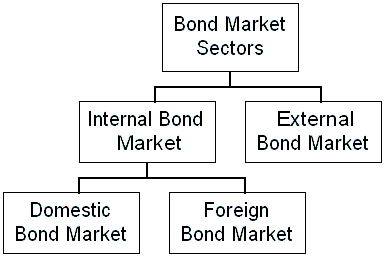Do you want BuboFlash to help you learning these things? Or do you want to add or correct something? Click here to log in or create user.
Subject 3. Legal, Regulatory and Tax Considerations
#basic-concepts #cfa #cfa-level-1 #fixed-income #has-images #reading-52-fixed-income-securities-defining-elements
An important consideration for investors is where the bonds are issued and traded; this affects applicable laws, regulations, and tax status.


The bond market can be classified into two markets: an internal market and an external market.
Internal Bond Market
The internal bond market is also called the national bond market. It is divided into two parts: the domestic bond market and the foreign bond market. The domestic bond market is where domestic issuers issue bonds and where these bonds are subsequently traded.
A foreign bond (called a Yankee bond in the U.S., a Samurai bond in Japan, and a Bulldog bondin the U.K.) is a bond issued in a country's national bond market by an issuer not domiciled in the country where those bonds are subsequently traded.
- Regulatory authorities in the country where the bond is issued impose rules governing the issuance of foreign bonds.
- Issuers of foreign bonds include national governments and their subdivisions, corporations, and supranationals (entities formed by two or more central governments through international treaties).
- They can be denominated in any currency.
- They can be publicly issued or privately placed.
External Bond Market
This market is also referred to as the international bond market, the offshore bond market, or the Eurobond market. The bonds in this market are:
- underwritten by an international syndicate.
- offered simultaneously to investors in a number of countries at issuance.
- issued outside the jurisdiction of any single country. Therefore, they are not registered through a regulatory agency.
- in unregistered form.
Eurobonds are subject to a lower level of listing, disclosure, and regulatory requirements than domestic or foreign bonds.
Eurobonds are classified according to the currency in which the issue is denominated. For example, if a Eurobond is denominated in U.S. dollars, it is called a Eurodollar bond. A USD bond issued by Ford and sold in Japan is thus called a Eurodollar bond, not a Euroyen bond.
A global bond is a debt obligation that is issued and traded in both the Eurobond market and at least one domestic market (for example, a USD bond issued by the Canadian government sold in the U.S. and Japan). Issuers of global bonds typically have high credit quality, and regularly have large fund needs. The first global bond was issued by the World Bank.
Tax Considerations
In general the income portion of a bond is taxed at the ordinary tax rate. Some countries implement a capital gains tax. Some countries even differentiate between long-term and short-term capital gains. There may be specific tax provisions for bonds issued at a discount or bought at a premium.
If you want to change selection, open original toplevel document below and click on "Move attachment"
Summary
| status | not read | reprioritisations | ||
|---|---|---|---|---|
| last reprioritisation on | suggested re-reading day | |||
| started reading on | finished reading on |
Details
Discussion
Do you want to join discussion? Click here to log in or create user.